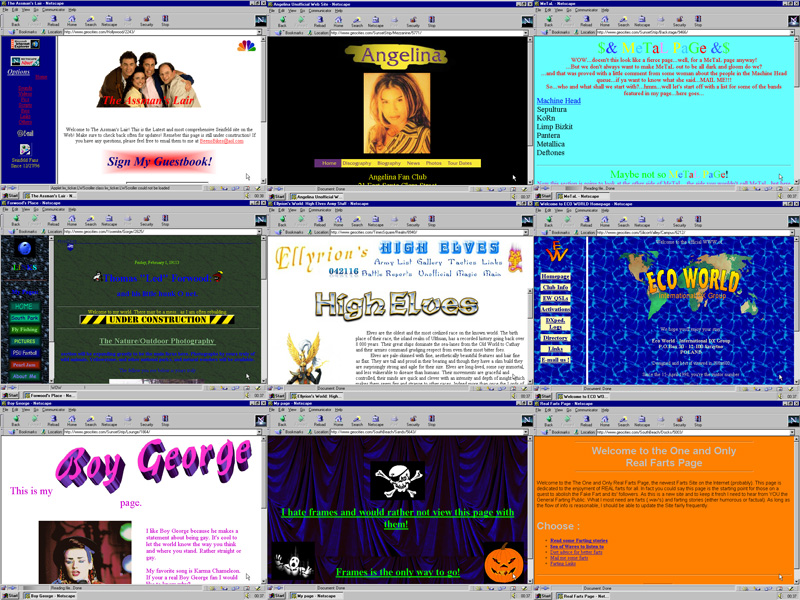reflecting on my introduction to HTML (coding diary #4)

Michael Scoggins |
7/6/2020

1. Think back on your first day of class. How did you think website were built? Now how do you think they’re built? What’s the difference in your thinking?
i definitely thought website were built sorta the way they actually are built. i used html to build a fansite for “the offspring” (that’s an old rock band for the millennials reading this) when i was in the 3rd grade. i also was using geocities (even fewer will remember that one) which was basically a rudimentary UI for placing tags/elements. i also learned how animation was done using keyframes a few years later. so none of this stuff was like, magic or anything. but the nuances, and the way functions are built, is definitely like learning a new language…. actually it’s like learning how to speak for the very first time. the difference in my thinking? websites are truly an art form, not even including the actual art (or its content at all) used in a given website.
2. What have you gained through this course beyond code? Beyond technical savvy?
i’ve learned that maybe it is possible to begin a new dream that can use all of my potential after all.
3. Where do you think you’re headed? Why? How? What are you going to do to encourage that?
i believe (hope) that i am headed toward a future of working with highly motivated and intelligent people whom i can contribute along with in meaningful ways… toward a market that is truly interested in positive change on a universal scale… toward a community i can join within a truly symbiotic relationship.
4. What kinds of projects do you see yourself working on in 10 months?
this thought kind of scares me. not really in a way where i’m scared of the job or project, but just the many moving pieces that could break in any number of ways to determine such a huge direction with a momentum i may not completely control.
5. Why is it generally a good idea to position CSS <link>s between <head></head> and JS <script>s, just before </body>? Do you know of any exceptions?
it’s a good idea because you want your stylesheets read first (so that your html elements inherit and thus display its rules) and your scripts read last so that it doesn’t slow down the loading of your html elements. an exception? when you have a function that you want triggered within window.onload (like if you have locale-dependent elements).
6. Consider HTML5 as an open web platform. What are the building blocks of HTML5?
APIs.
7. What’s the difference between the :nth-of-type() and :nth-child() selectors?
:nth-of-type() will skip children and pick that numbered(n) element next in the list of the named element, while :nth-child() will pick that numbered(n) child within the named element, given it has at least as many children as the number specified.
8. What is CSS-selector specificity, and how does it work?
it is the order in which your rules will be applied. is the overriding hierarchy the rules must follow (rules with rules!) when there’s two specified ways one element should be. #id selectors are highly specific, while *(universal) selectors are highly unspecific. the details are almost as complex as learning css itself, so i will assume this is not the time nor place for them.
9. What resources do you use to learn about the latest in front-end development and design?
i’m still trying to study the earliest! as well as some of the middling in front-end dev/design. if the question i look up whose top answer is recent, then THAT’S WHERE. seriously though, this is a good question to force me to think more about the importance of keeping up with the newer trends so that i might learn something new and possibly extremely useful, something which could put me on a much faster track than trying to study all the little details as i build stuff from scratch. however, it’s also something to be wary about, as keeping up with trends is a good way to diminish your originality.